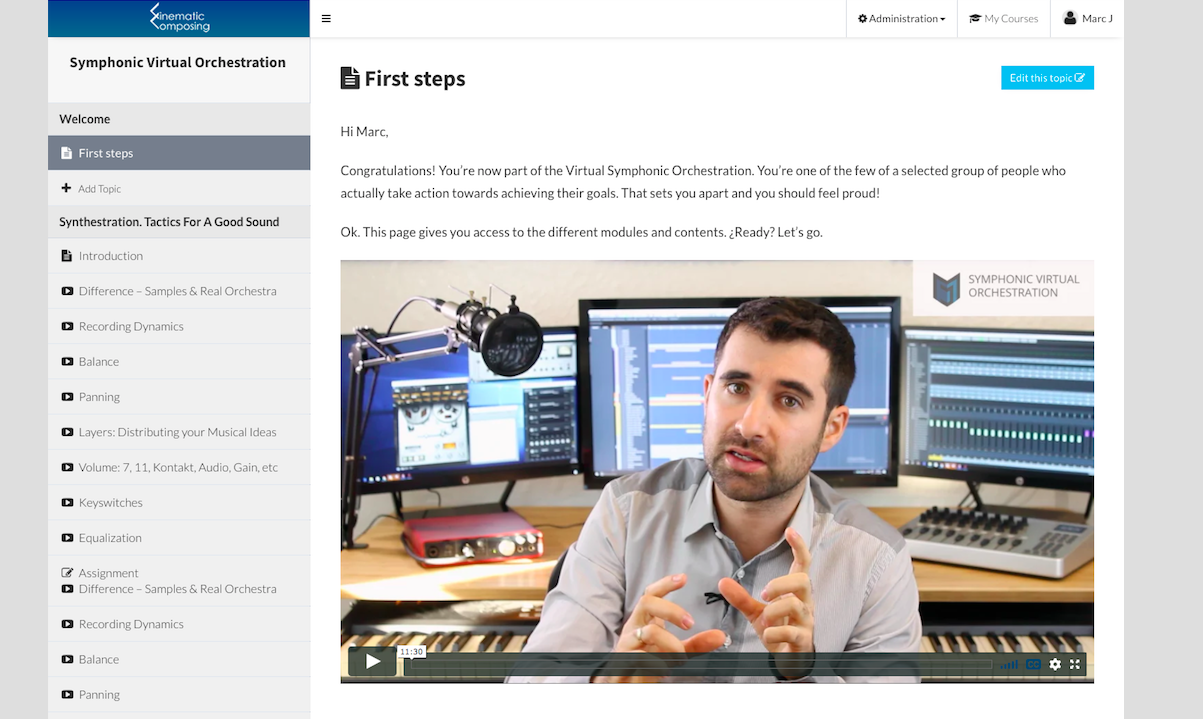Review of the New World of Online Music Courses
Mar 11, 2022
Evenant, Thinkspace and Cinematic Composing are three different music schools that prepare students for the cinematic and the commercial production, specifically in the area of composition.
I recently met William Hoshal, a student who had the chance to be in each school. Now, he's sharing his experience and opinion with us.
The world of music education is changing
For some of us, that change has been in the wind for many years, but the traditional institutions of music education have largely resisted it.
Nonetheless, as the industry and business of music have dramatically shifted, so too have the needs of students.
Even though many long-established institutions have been slow to respond and adapt, a few such as Berklee College of Music, have curated online music courses and programs to target modern careers in the field of music including film and television composition, music for video games, and sound design.
The major drawback is that such a program can carry a hefty price-tag.
In light of this, a growing trend is centered around more cost-friendly, specialized schools with classes taught by working industry professionals and in some cases, offering degrees or certificates affiliated with brick and mortar schools.
Virtual schools of music now utilize technology to teach everything from traditional theory and orchestration, to the latest bleeding-edge disciplines that target new careers in music and production.
In this article, I will discuss three such emerging virtual schools: Thinkspace Education, Evenant, and Cinematic Composing.
THINKSPACE REVIEW
Thinkspace Education, started by British composer Guy Michelmore, is the largest and oldest of the three discussed here.
It’s philosophy, like the others, is simple: present the kind of online music courses that allow aspiring composers and musicians to become marketable in the modern music world.
What started with a handful of classes (Music For The Media and Cinematic Orchestration to name two), has grown into a large-scale enterprise that offers 18 online courses, including 6 Master’s degree course tracks with accreditation through the University of Chichester in England.

The mid-level Premium courses come in Standard or Gold Editions, with the latter offering written feedback on assignments from working professionals in the United States and abroad.
At the time of my experience, tuition in the Premium classes (completion of which is usually set at one year, although students can extend the timeline as much as needed for a charge) included a limited number of tutorial credits that can be applied to whichever assignments in the course the student wishes to have critiqued in detail.
You can extend the tuition if you need more time to complete the course
- 3 months: $75
- 6 months: $150
- 1 year: $300

Also, additional credits can be purchased for more personal tutoring. A pack of 4 tutorial credits costs $250.
The course materials are presented in a combination of audio/video interviews and written coursework, all of which are downloadable.
Depending on the particular course, some knowledge of music and theory is required, but they also offer courses in basic music theory to get new students up to speed. Each unit has a variety of assignments for the student to choose from and the scoring assignments include clips of scenes to load and score.
Prices run from $99 for the short workshop-style classes up to $10,000 for the MFA degree programs, and they offer several extended payment options.
EVENANT REVIEW
At the other end of the spectrum in terms of cost and time commitment is Evenant.
This smaller collection of online music courses was (like Thinkspace) started by working composers Christian Baczyk and Wahlid Feghali and presents a solid introduction to the areas of media music composition and production that is quite accessible to the general public.
The courses are more broad in presentation and may be less intimidating to students with little or no music education who want to delve into the world of film and library music.

That’s not to say that Evenant’s classes are only for novices.
These guys know their stuff and even seasoned professionals are going to come away with very useful nuggets of information.
The course materials are again presented in a combination of audio/video examples, tutorials, and written summarization.
They do include over-the-shoulder view walkthroughs of some units in the classes that prove very interesting for those that want to watch the entire process of creating a cue or piece of music from scratch.

Instructor feedback is minimal, generally through the message boards that accompany each unit in their online platform, but the instructors do respond in a timely fashion and impart some good advice.
Costs for the Evenant courses range from less than $50 to around $300 depending on the class.
They offer bundle packages and payment plans and lifetime access to the materials.
CINEMATIC COMPOSING REVIEW
Last but not least in our survey of online music courses is Cinematic Composing.
One of the newer online schools, Cinematic Composing was started by film composer and Berklee instructor Marc Jovani, and is designed to offer the best of both worlds of the previously discussed programs, both in cost and comprehensiveness.
Originally started with one class centered around virtual orchestration mock-ups, Cinematic Composing’s course offerings have quickly expanded to include orchestration, library music and composition with more being added all the time.

Materials are detailed and comprehensive — more in the Thinkspace and Berklee model — but still presented in such a manner as to be accessible to those students with limited musical knowledge.
Video demonstrations, walk-throughs, and over-the-shoulder examples in each module of the courses offer a detailed analysis of the concepts.
The videos also offer helpful insights into working with most of the common DAWs and plugins that are used in the industry and detailed discussions of the sample libraries and templates that the composer is using.
Written materials are presented cleanly and concisely via Cinematic Composing’s online platform.
One major difference in Cinematic Composing’s course structure that becomes apparent from the beginning is the instructor interaction.
Every assignment receives an extensive video analysis and critique, with the instructor pointing out many positive aspects of the student’s work and offering invaluable insights and tips.

Further instructor (and student) interaction is through Cinematic Composing’s private Facebook group (Thinkspace and Evenant have Facebook groups that are also open to the public) in discussions that range from basic software and hardware discussions to advanced orchestration techniques and industry-related debates.
The relaxed environment encourages students to post musical examples beyond those attached to the course-work and receive feedback from both their fellow students and the instructors.
In addition, Cinematic Composing includes a number of bonus master-classes, live streamed with composers, recording engineers and many other industry professionals.
Most interesting, is a weekly live online chat with the instructor and fellow students that serves to further enhance the virtual classroom experience.
All courses include lifetime access to the materials and all updates. The cost structure is more in the middle of the spectrum compared to those we’ve discussed, ranging from around $400 to $1.847, still a great value in terms of comprehensiveness and benefits.
COMPARISON CHART

WHICH ONE IS THE RIGHT FOR ME?
In many cases, it comes down to what the student is looking for in an online music course.If they are somewhat new to film and media
If they are somewhat new to film and media music, but are still looking for a good grounding in many of the concepts, Evenant is going to be a good starting place and will likely spark the interest to study further.
If they are far more comfortable in a somewhat traditional classroom setting, with lots of detailed information, then Thinkspace and Cinematic Composing is going to serve them very well, with the latter offering extensive hands-on tutorials and considerable one-on-one interaction with the instructors.
There you have it, a short discussion of several of the online music courses and options that are available out there.
All of the discussed schools offer previews of their courses, online help and easily accessible contact information for inquiries into the programs.
One thing that they all clearly share in common is a dedication to promoting a vibrant music education for new generations of composers and musicians.
Have you taken any of these courses? I'd love to hear about your experience! Leave your comment below!


